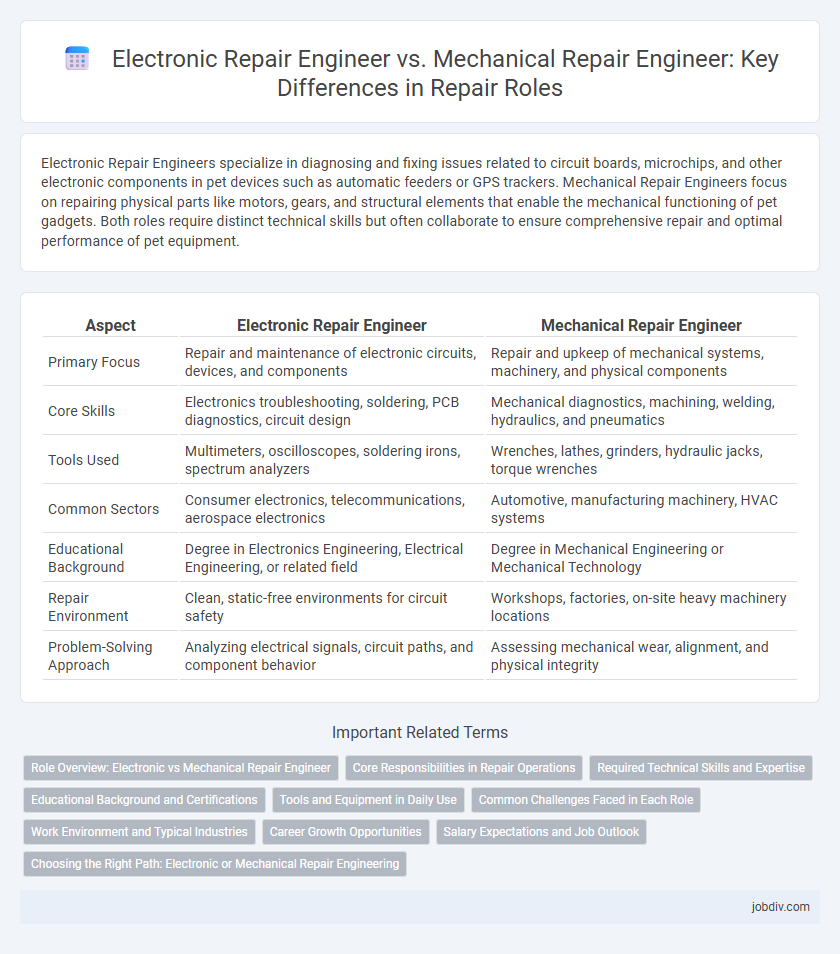Electronic Repair Engineers specialize in diagnosing and fixing issues related to circuit boards, microchips, and other electronic components in pet devices such as automatic feeders or GPS trackers. Mechanical Repair Engineers focus on repairing physical parts like motors, gears, and structural elements that enable the mechanical functioning of pet gadgets. Both roles require distinct technical skills but often collaborate to ensure comprehensive repair and optimal performance of pet equipment.
Table of Comparison
| Aspect | Electronic Repair Engineer | Mechanical Repair Engineer |
|---|---|---|
| Primary Focus | Repair and maintenance of electronic circuits, devices, and components | Repair and upkeep of mechanical systems, machinery, and physical components |
| Core Skills | Electronics troubleshooting, soldering, PCB diagnostics, circuit design | Mechanical diagnostics, machining, welding, hydraulics, and pneumatics |
| Tools Used | Multimeters, oscilloscopes, soldering irons, spectrum analyzers | Wrenches, lathes, grinders, hydraulic jacks, torque wrenches |
| Common Sectors | Consumer electronics, telecommunications, aerospace electronics | Automotive, manufacturing machinery, HVAC systems |
| Educational Background | Degree in Electronics Engineering, Electrical Engineering, or related field | Degree in Mechanical Engineering or Mechanical Technology |
| Repair Environment | Clean, static-free environments for circuit safety | Workshops, factories, on-site heavy machinery locations |
| Problem-Solving Approach | Analyzing electrical signals, circuit paths, and component behavior | Assessing mechanical wear, alignment, and physical integrity |
Role Overview: Electronic vs Mechanical Repair Engineer
Electronic Repair Engineers specialize in diagnosing, troubleshooting, and repairing circuit boards, sensors, and electronic components in devices such as computers, communication equipment, and medical instruments. Mechanical Repair Engineers focus on maintaining and restoring mechanical systems including engines, HVAC units, and manufacturing machinery by addressing wear, alignment, and lubrication issues. Both roles require expertise in their respective domains but differ fundamentally in the type of systems they service and the technical skills they apply.
Core Responsibilities in Repair Operations
Electronic Repair Engineers specialize in diagnosing and fixing circuit boards, semiconductors, and microprocessors, ensuring optimal performance of electronic devices. Mechanical Repair Engineers focus on maintaining and repairing machinery parts such as gears, bearings, and hydraulic systems to restore mechanical functionality. Both roles require precise troubleshooting skills but differ significantly in technical expertise and repair methodologies.
Required Technical Skills and Expertise
Electronic Repair Engineers require proficiency in circuit analysis, microcontroller programming, and diagnostic tools for troubleshooting complex electronic systems. Mechanical Repair Engineers must possess strong skills in mechanical assembly, CAD modeling, and familiarity with hydraulic and pneumatic systems to effectively maintain and repair physical machinery. Expertise in soldering, oscilloscope usage, and understanding electrical schematics distinguishes electronic repair, while mechanical repair focuses on machining, welding, and interpreting mechanical blueprints.
Educational Background and Certifications
Electronic Repair Engineers typically hold degrees in electronics, electrical engineering, or related fields, with certifications such as IPC-A-610 or CompTIA A+ enhancing their qualifications. Mechanical Repair Engineers often possess backgrounds in mechanical engineering or industrial maintenance, supported by certifications like Certified Maintenance & Reliability Professional (CMRP) or HVAC certification. Both roles require specialized technical education aligned with their distinct repair domains and industry-recognized certifications to validate expertise.
Tools and Equipment in Daily Use
Electronic Repair Engineers primarily use precision tools such as soldering irons, multimeters, oscilloscopes, and circuit testers to diagnose and fix electronic components. Mechanical Repair Engineers rely on wrenches, screwdrivers, hammers, hydraulic jacks, and torque wrenches to disassemble, repair, and reassemble mechanical systems. Both professionals often incorporate diagnostic software and specialized measuring instruments tailored to their respective fields for accurate troubleshooting and maintenance.
Common Challenges Faced in Each Role
Electronic Repair Engineers frequently encounter challenges such as diagnosing complex circuit failures, managing delicate components, and keeping up with rapid technological advancements in microelectronics. Mechanical Repair Engineers often face issues related to wear and tear of moving parts, precise alignment requirements, and the need for robust troubleshooting of mechanical systems under high stress or variable loads. Both roles demand strong problem-solving skills and the ability to use specialized diagnostic tools, yet their challenges differ significantly due to the nature of electronic versus mechanical systems.
Work Environment and Typical Industries
Electronic Repair Engineers typically work in controlled indoor environments such as laboratories, manufacturing plants, and service centers, specializing in industries like telecommunications, consumer electronics, and aerospace. Mechanical Repair Engineers often operate in more diverse settings including industrial plants, automotive workshops, and construction sites, focusing on sectors like heavy machinery, automotive, and manufacturing. Both roles demand precision and technical expertise but differ significantly in physical work conditions and industry applications.
Career Growth Opportunities
Electronic Repair Engineers typically experience rapid career advancement due to the increasing demand for expertise in complex circuit diagnostics and emerging technologies like IoT and AI integration. Mechanical Repair Engineers often benefit from steady growth opportunities in industries such as manufacturing, automotive, and aerospace, where hands-on skills in machinery maintenance and hydraulic systems remain crucial. Both fields offer specialization paths, but Electronic Repair Engineers may have a broader scope in high-tech sectors, enhancing long-term career progression.
Salary Expectations and Job Outlook
Electronic repair engineers typically command higher salaries, with a median annual wage of approximately $78,000, driven by demand in industries like telecommunications and consumer electronics. Mechanical repair engineers earn a median salary around $65,000, reflecting steady opportunities in manufacturing and automotive sectors. Job outlook for electronic repair engineers is projected to grow by 7% over the next decade, outpacing the 4% growth expected for mechanical repair engineers due to accelerated technological advancements and digitization.
Choosing the Right Path: Electronic or Mechanical Repair Engineering
Choosing between electronic and mechanical repair engineering depends on your interest in circuit design, semiconductor components, and troubleshooting electronic devices versus expertise in machinery, hydraulics, and mechanical systems. Electronic repair engineers work extensively with printed circuit boards, microcontrollers, and digital diagnostics tools, while mechanical repair engineers focus on maintenance, calibration, and repair of engines, HVAC systems, and industrial equipment. Assessing career goals, industry demand, and skill preferences helps determine the most suitable path within the repair engineering field.
Electronic Repair Engineer vs Mechanical Repair Engineer Infographic

 jobdiv.com
jobdiv.com